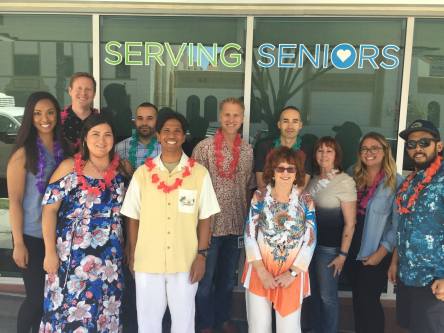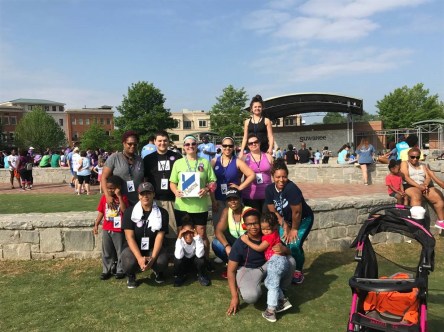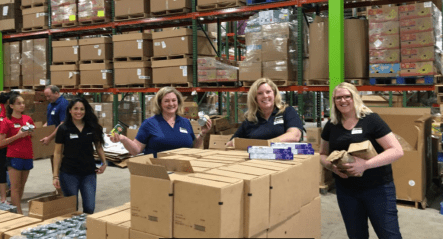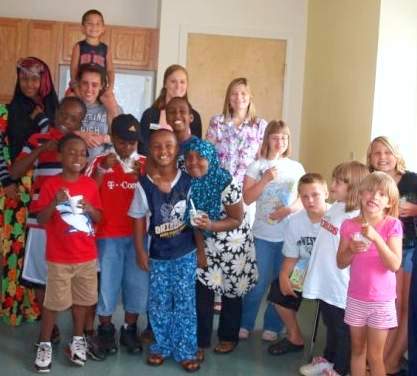Did you know that 48 percent of California’s seniors lack sufficient income to cover housing and meals? That means two out of every five seniors have to choose between paying rent and having enough money for food. Serving Seniors is a 501c3 nonprofit that minimizes the financial burden faced by thousands of San Diego seniors. Since 1970, Serving Seniors has offered vital services including food, health care, housing, social and educational opportunities. It is the only organization of its kind in the county, and one of few in the country, to provide for the fundamental needs of seniors. Food and housing top the organization’s list of priorities. Seniors ages 60 and older are eligible for congregate meals and physical, mental, and social health services. Seniors 62 and older are eligible for those services as well as permanent affordable housing at the organization’s communities in East Village and City Heights. There is also a transitional housing program for seniors facing housing insecurity. “Meals and affordable housing are the most-needed services we offer,” says Shannon Fogg, Communications and Special Events Manager at Serving Seniors. “San Diegans can always volunteer to help serve meals or lead classes. Any kind of class is typically interesting to our curious seniors.” Serving Seniors understands that clients have needs beyond the necessities. Learning and socialization opportunities give seniors a chance to make new friends, learn new skills and develop existing abilities. To maintain mental and physical agility, seniors participate in classes for low or no costs. Yoga, Tai Chi, interactive games, art, crafts, and health education classes are just of few opportunities for mature adult learners. The Civic Engagement league empowers low-income seniors to address challenges that impact their community. They participate in volunteer opportunities, brainstorm and execute solutions to community issues....
ATL March of Dimes
March for Babies
Atlanta summers are known for their sweltering heat and ruthless humidity. Those conditions were no match for Yardi Atlanta. The team of eight braved the heat to show their support for babies during the March of Dimes March for Babies. Supported by donations from fellow team members, their efforts helped to give hope and support to babies and their families. March of Dimes was born as the National Foundation for Infantile Paralysis, a response to President Franklin Roosevelt’s personal struggle with polio and his desire to see the disease eradicated. The organization fought and achieved its mission to end polio in the United States before turning its attention to broader services. The nonprofit now supports March of Dimes Prematurity Research Center in its fight for healthy babies. The center leads in groundbreaking research on the genetic causes of birth defects, screening methods, as well as pregnancy education for medical professionals and the general public. March of Dimes and the Prematurity Research Center have experienced major breakthroughs. The teams created and improved surfactant therapy to treat respiratory distress. The new Folic Acid Campaign successfully reduces incidences of neural tube defects and birth defects of the brain and spine. The organizations also founded a system of regional neonatal intensive care centers for premature and sick babies. To continue the good work, March of Dimes relies on March for Babies as its primary fundraiser. There are thousands of marches across the United States each year, each one uniting teams of family members, coworkers, and friends on a journey towards a future for healthy babies. Yardi Atlanta team members Heather Humrich, Monique Benson, Ken Romero, Kami Reid, Wendy Caffrey, Shana Winbush, Charity Williams, and Elizabeth Daniels participated in the march. They represented Yardi on the walk of the...
Raleigh Food Bank
Corporate Training Team
The Corporate Training Team recently convened for its annual conference. Participants dedicated one morning of the event to volunteering at the Raleigh branch of the Food Bank of Central and Eastern North Carolina (Food Bank CENC). “For my team, since we’re spread through the U.S., we only get together once a year,” says Debbie Lamberson, Team Leader, Corporate Training at Yardi. “We spend much of that time learning but this year we wanted to do team building. Everybody wants to do it again next year! It was hard work but it was exciting to know how much what we were doing was going to help seniors.” Yardi Employees Lamberson, Jamie Hall, Jon Hodgkin, Julie Taylor, Lacey Petch, Laura Guerrero, Lina Castanon, Marcus Rutherford, Patty Evans, and Steve Harris participated in the event. Cary Middle School Future Business Leaders joined Yardi employees that morning, adding a fun dynamic to the group. The team of 25 sorted and assembled packages that would be distributed to smaller food banks in the area. With their efforts combined, the volunteers completed 484 boxes for seniors in three hours, beating the organization’s record average of 450 boxes per shift. The boxes contained about 14,360 lbs of food. “The Food Bank figures 19 ounces for an average senior meal, so we created 12,101 meals,” says Lamberson. The Raleigh branch of Food Bank CENC provides relief for the vulnerable populations of 13 counties. In this region, the United States Census Bureau reports that 27.9 percent of the local population earns an income that falls below the poverty level. Food Bank CENC estimates that more than 45,500 seniors in its region live in poverty, and thousands more struggle to survive on a fixed income. Food donation packaging is just one of the many...
Housing and Helping
The Caleb Group
At the Caleb Group, a home is much more than just a place to rest at night. The affordable housing provider, based in Swampscott, Mass., aims to improve the lives of its residents. With a strong foundation of community service created by founders Joan and Warren Sawyer, the Caleb Group has been doing good works for more than two decades. The company, a Yardi client, was recently recognized in its hometown paper, The Daily Item, with a write-up that tells the touching story of how the Sawyers, motivated by faith and a desire to help out their community, founded the company in 1992. Their original vision of service and support for residents remains strong today. “Housing itself isn’t enough. Residents and their communities flourish when they are supported by the kinds of programs and resources that Caleb’s Service Coordinators and Community Opportunity Centers provide,” the company’s website explains. Programs for residents access to services and resources that foster “community engagement, financial stability, health and family support, and youth programming.” More than 4,000 residents in 21 communities benefit. Literacy, financial counseling, continuing education and work experience are among the offered programs. The good works don’t end there. The company also provides support to Abbott House, which houses formerly homeless families in Dorchester, Mass, and an international home for domestic violence victims in San Juan del Sur, Nicaragua. Family values are strong within the company leadership. The Sawyer’s daughter, Debra S. Nutter, is President and CEO. She was a founder of the company. Her parents still serve on its Board of Directors. Yardi salutes the Caleb Group for its exceptional community service. Read more about how the company has helped residents change their lives for the...




